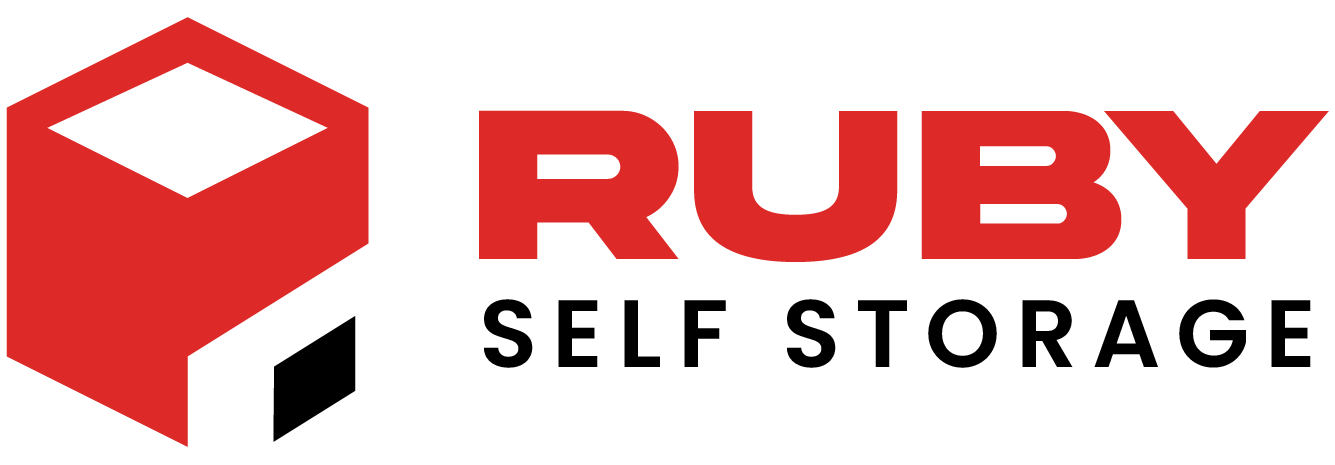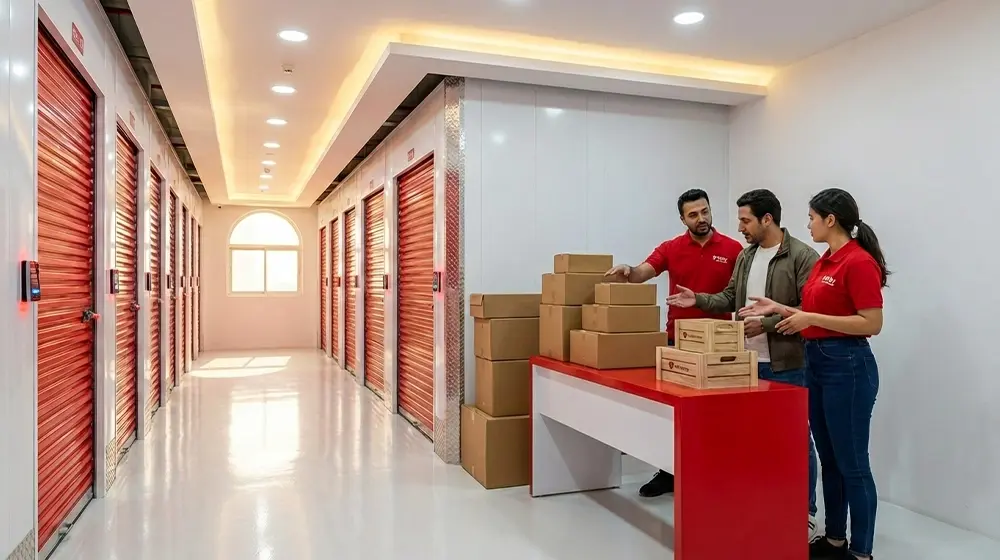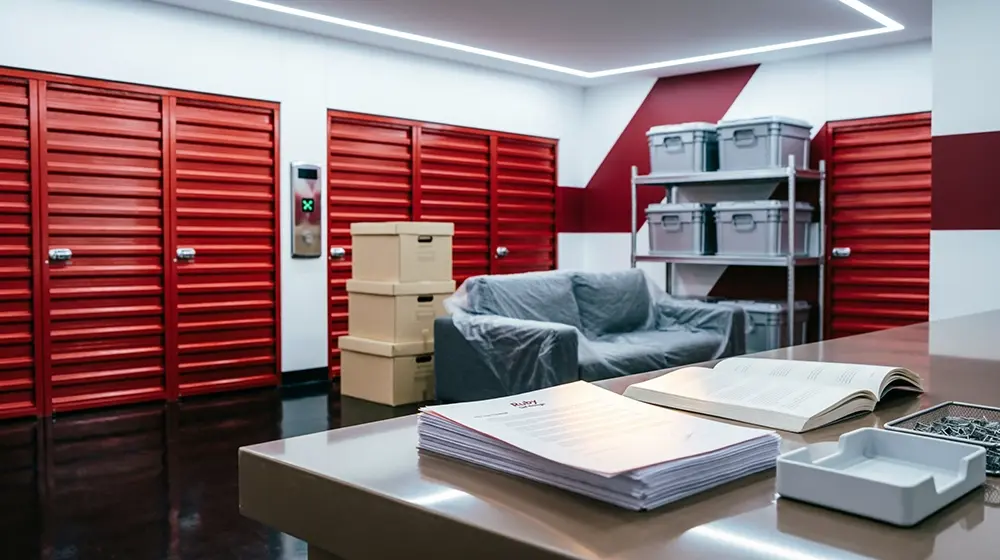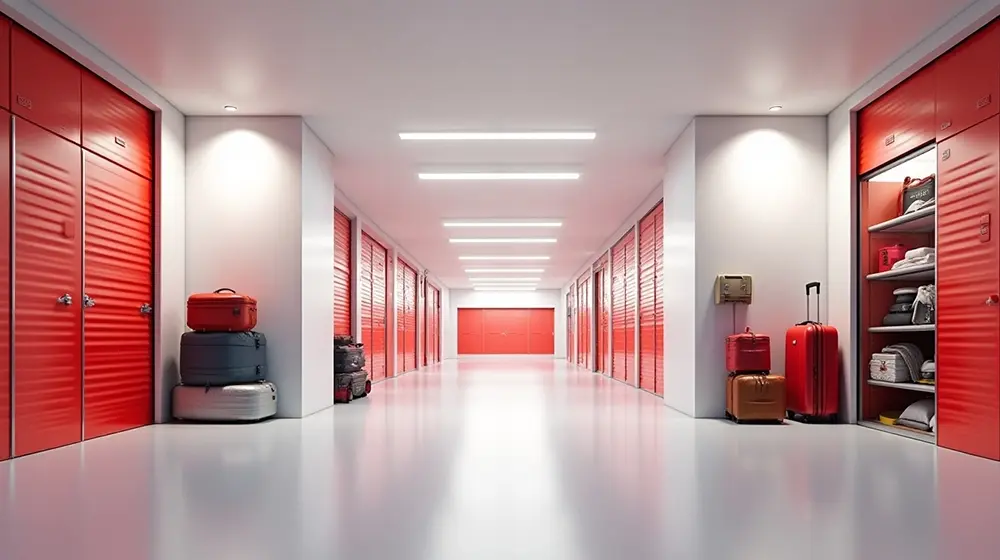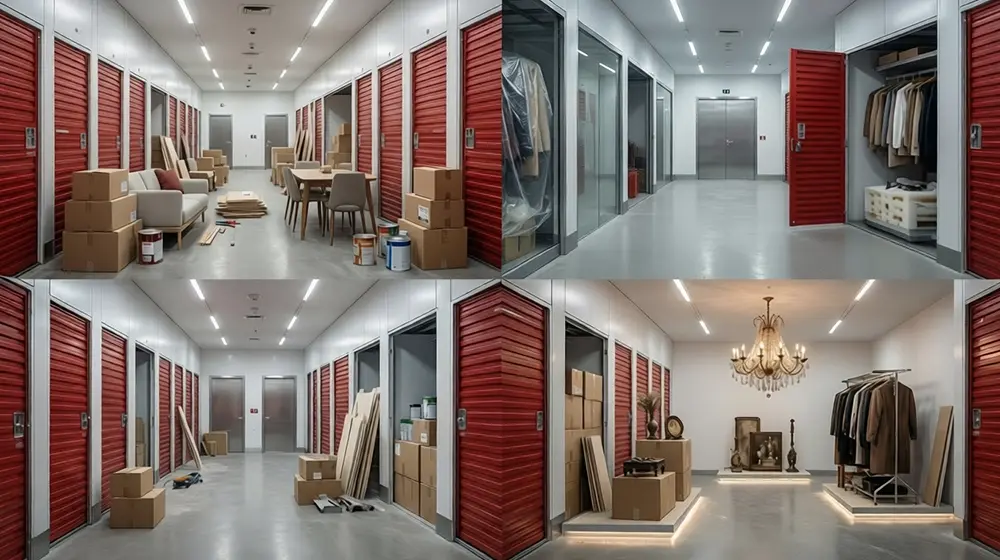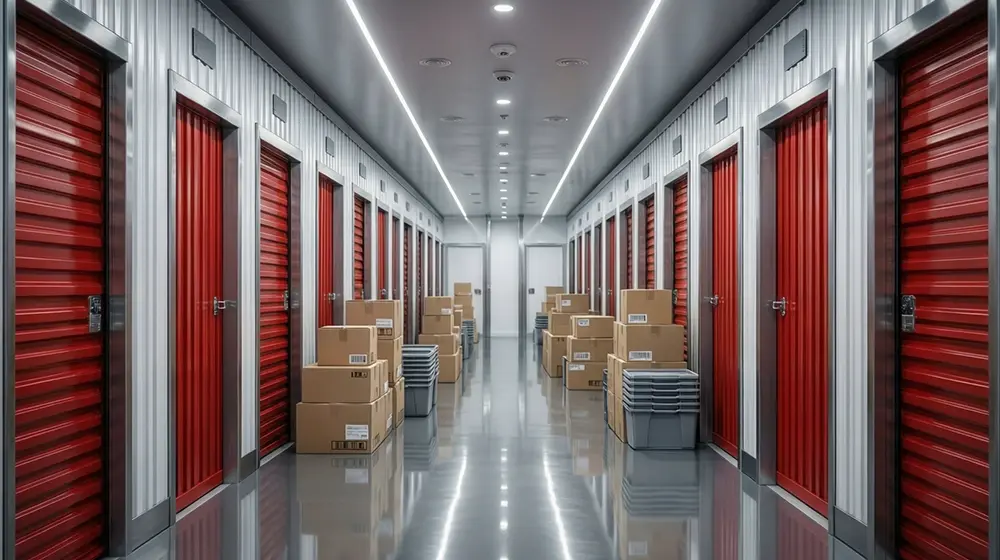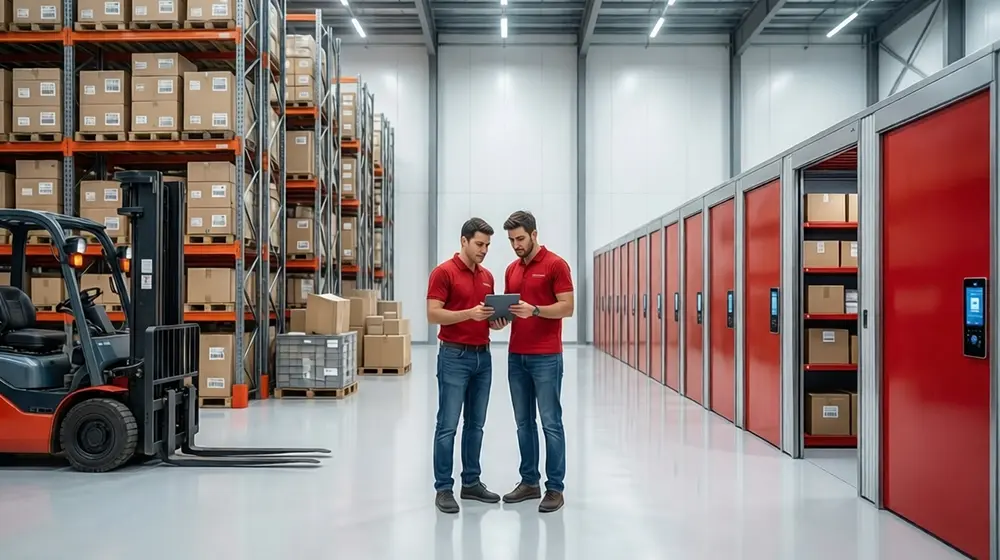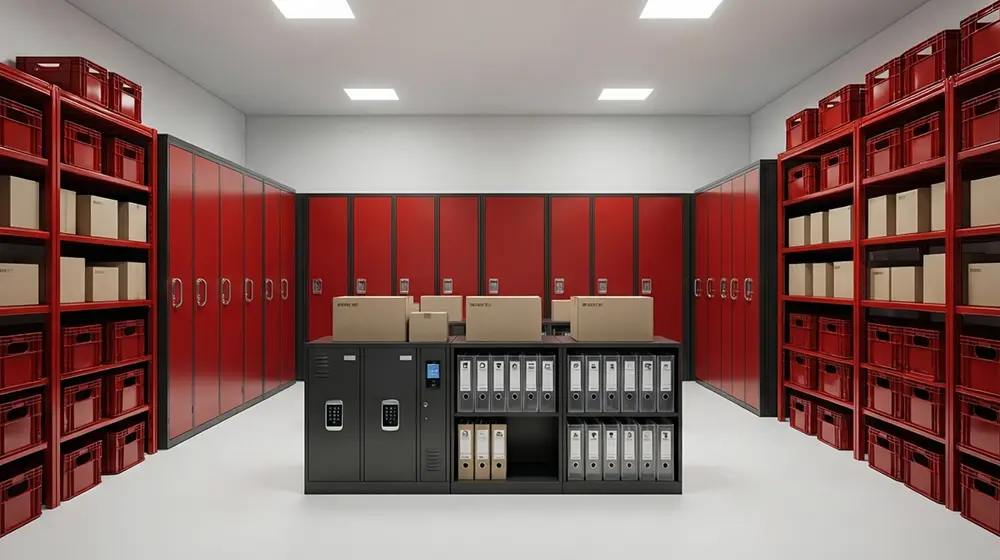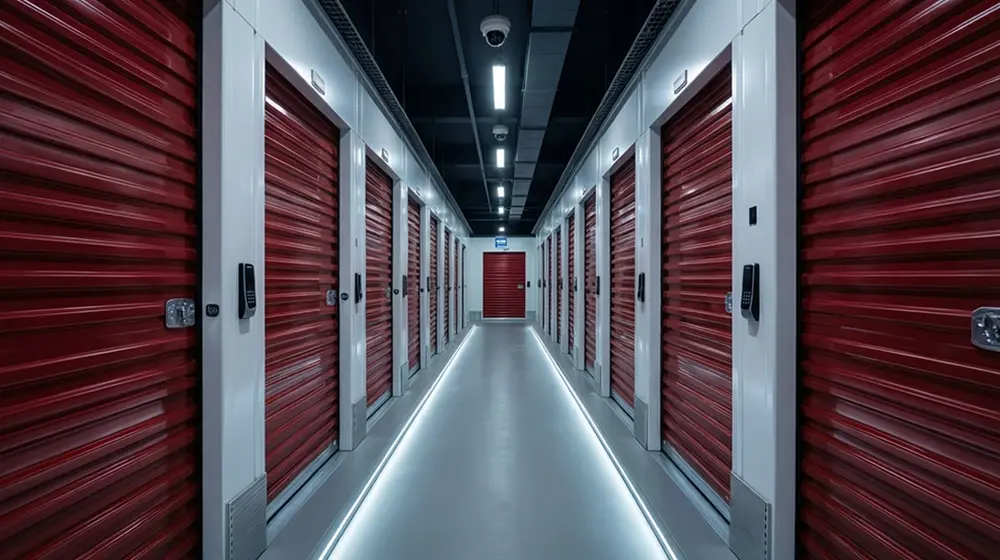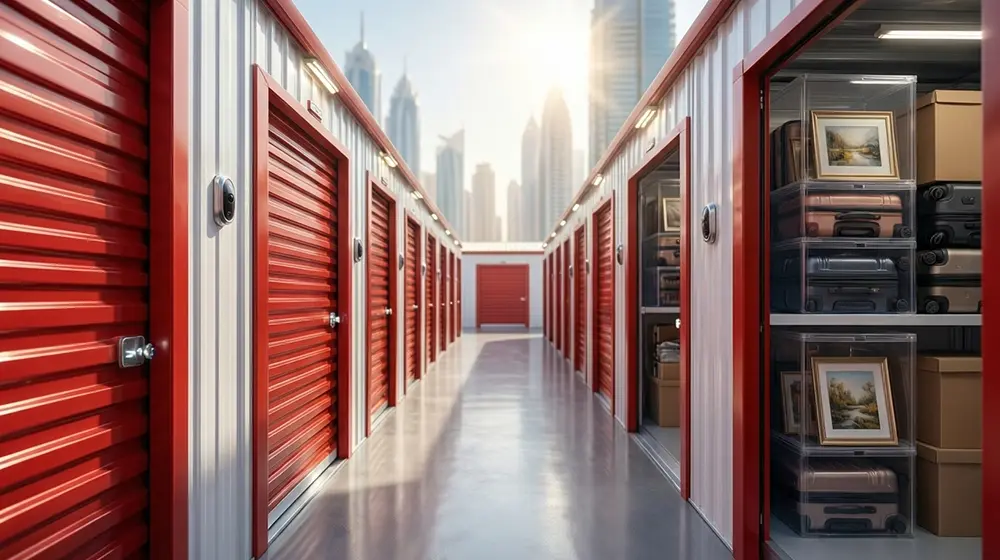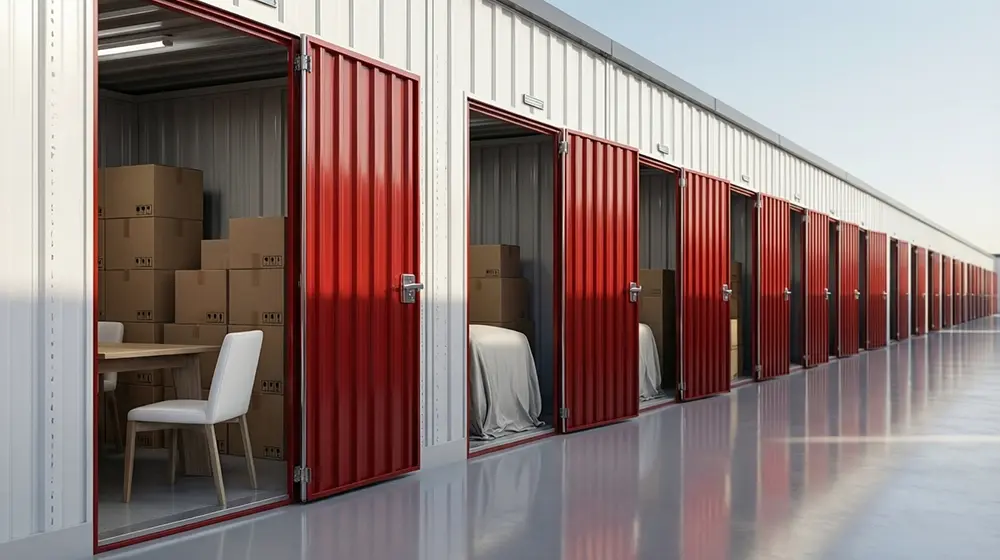Dubai’s rapid urban growth and high mobility have made self storage security a top concern for both residents and businesses. With people frequently relocating, downsizing, or running e-commerce operations, demand for storage has surged. But in a city where temperatures exceed 45°C, humidity averages 55–65%, and property crime, while lower than global averages, still exists, securing belongings goes beyond a padlock.
Why observe security before storing:
- Theft risks: Even advanced facilities face intrusion attempts.
- Climate risks: Heat, humidity, and sandstorms damage unprotected goods.
- Fire and water hazards: Compliance with the UAE Fire and Life Safety Code is mandatory but not always consistent.
- Insurance gaps: Operators often limit liability, making tenant insurance essential.
Security and location are the two biggest decision factors for tenants choosing storage. This guide explores the security needs tenants must evaluate before renting storage space in Dubai, covering technology, environmental safeguards, insurance, and tenant best practices.
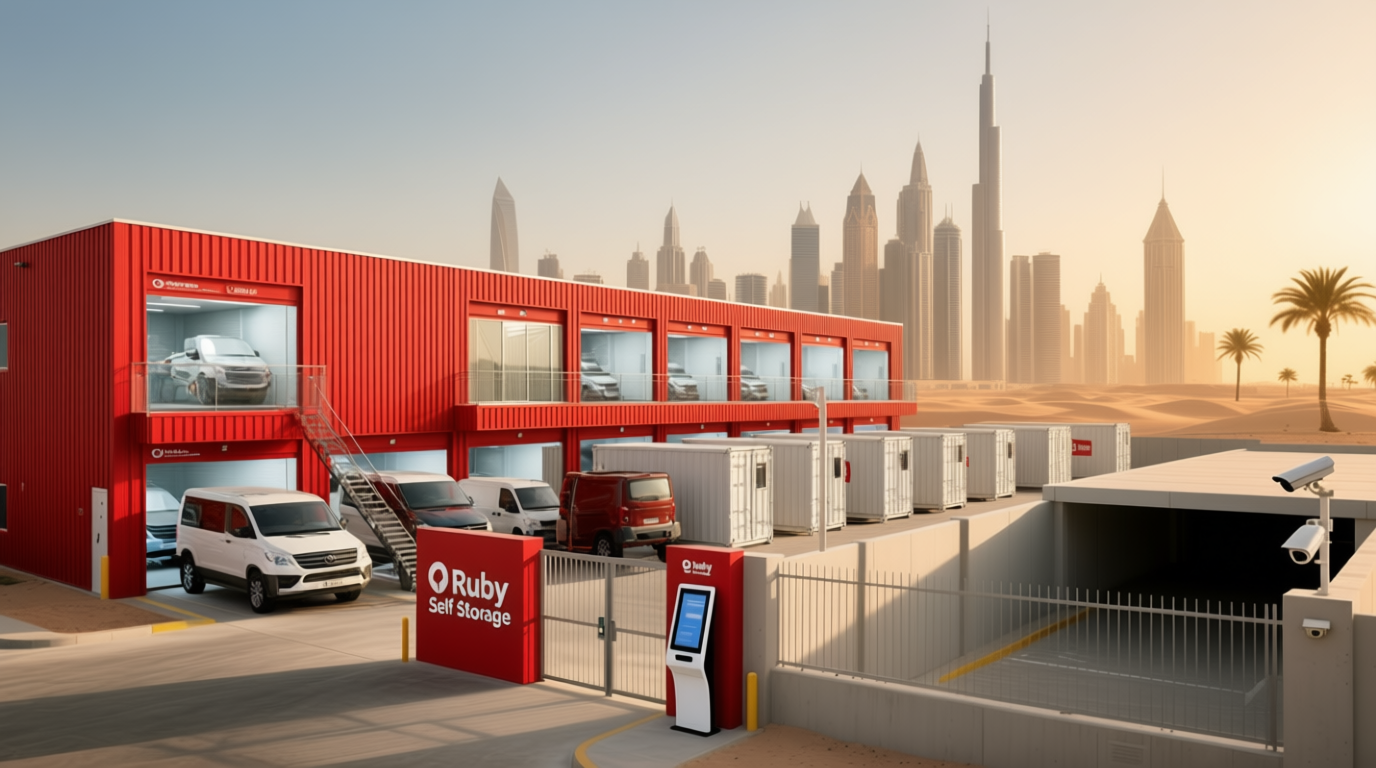
Why Self Storage Security Matters in Dubai
Security in self storage is not optional; it is a fundamental expectation. Dubai’s dynamic lifestyle means tenants often leave belongings unattended for months, sometimes years, which increases vulnerability.
The Real Risks in Storage Facilities
- Unauthorized entry: Facilities without access control face intrusions.
- Internal theft: Staff or contractors may exploit weak monitoring.
- Fire hazards: Electrical faults or improperly stored items increase risks.
- Environmental exposure: High heat and humidity accelerate damage.
In self-storage, it makes sense to prep your on-site managers as the first line of defense. Training should include how to deter criminals, what to look for in a walk-through, such as open locks on a unit or broken gates, and who to contact if something’s suspicious.
Why Security as a Value Factor
Storage costs in Dubai vary widely, but the safest facilities charge higher fees due to investments in CCTV, smart locks, and climate control. Tenants should view this as risk prevention, not just an expense.
Core Security Standards Every Dubai Storage Facility Must Provide
Not all storage operators meet international standards. Tenants should demand these core security features:
CCTV Surveillance That Leaves No Blind Spots
CCTV acts as both a deterrent and an evidence source. However, it only works if placed strategically.
Best practices:
- Cameras installed in hallways, entrances, and parking areas.
- Continuous recording with 30+ days of retention.
- Live monitoring for instant alerts.
CCTV is associated with a significant and modest decrease in crime.
Smart Gate Systems With Traceable Access
A locked gate is not enough; entry should be tracked and assigned to individuals.
Standards tenants should expect:
- Unique PINs, cards, or biometrics for each user.
- Automatic Number Plate Recognition (ANPR) for vehicles.
- Digital logs stored for audits.
Crime prevention through environmental design (CPTED) research confirms that controlled access is one of the strongest deterrents.
Individual Unit Alarms Instead of Site-Wide Alerts
Single alarms delay responses. Unit-level alarms provide immediate detection.
Features to verify:
- Alarms assigned to each unit.
- Motion sensors in restricted areas.
- Alerts sent to staff and tenants.
Alarm-equipped units see fewer successful break-ins.
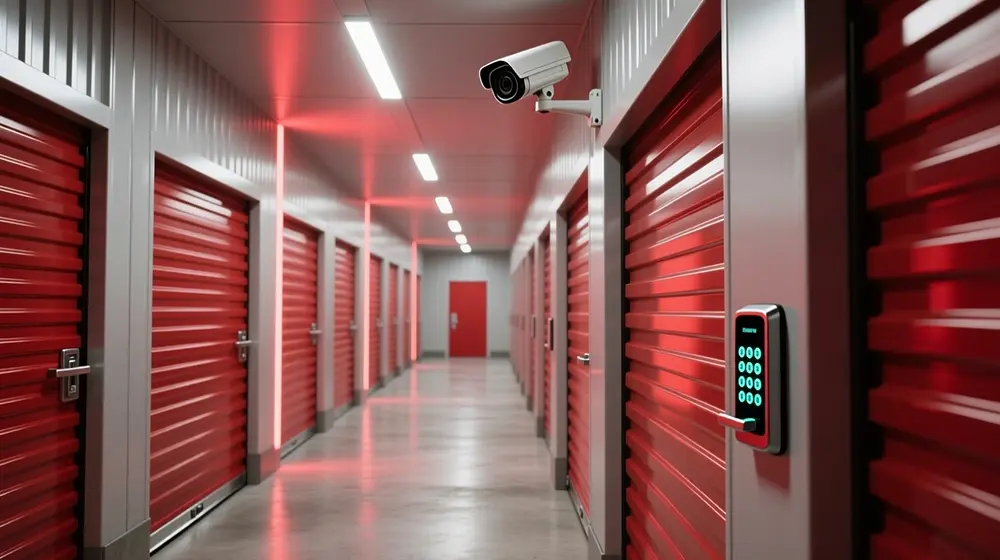
Lighting That Eliminates Blind Spots
Lighting is one of the cheapest but most effective defenses.
Tenant checks:
- Consistent LED lighting in corridors and parking.
- Backup power for outages.
- No dark corners near units.
Street lighting improvements cut crimes by 12–21% in trials.
Security Staff Who Add Human Oversight
Technology alone cannot replace human response.
Best practices:
- 24/7 staff presence.
- Scheduled and documented patrols.
- Incident response protocols.
Facilities with both guards and technology report significantly fewer repeat incidents.
Fire, Heat, and Water Protection Built Into the Facility
Dubai’s climate creates risks beyond theft.
Safeguards tenants should confirm:
- Fire: sprinklers, alarms, and compliance with the UAE Fire Code.
- Heat: climate-controlled HVAC systems.
- Water: drainage systems, raised flooring, and flood sensors.
Mold can develop within 48 hours in Dubai’s humidity.
Minimum vs. Best Practice Security in Dubai
| Feature | Minimum Standard | Best Practice in Dubai |
|---|---|---|
| CCTV | Entrance-only cameras | Full coverage + 30-day logs |
| Access Control | Shared gate code | Unique IDs + ANPR logs |
| Alarms | Site-wide alarm | Unit-level alarms + alerts |
| Lighting | Corridor bulbs | LED + backup system |
| Staff | Daytime only | 24/7 with incident logs |
| Fire/Climate | Smoke detector only | Sprinklers, HVAC, drainage |
Environmental Safeguards That Go Beyond Compliance
Dubai’s climate makes environmental protection essential. Premium facilities don’t just comply with UAE fire codes; they go further.
Key environmental safeguards:
- Climate control systems to regulate both temperature and humidity.
- Sprinkler systems and fire-resistant building materials.
- Drainage and raised floors to prevent water damage.
Mold forms within 48 hours in 55–65% humidity, which is common in Dubai summers.
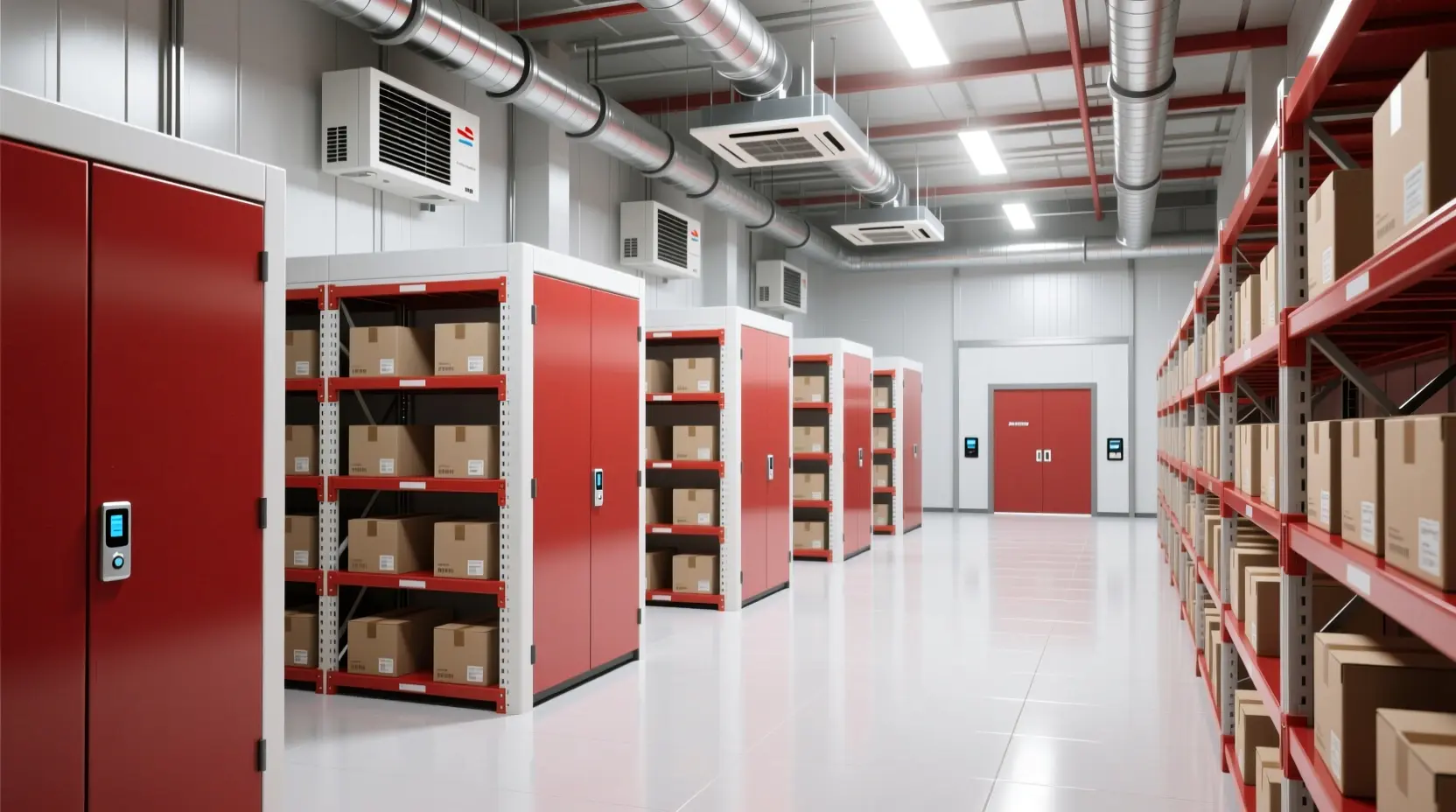
How Premium Facilities Compare to Budget Operators
| Feature | Budget Storage | Premium Storage in Dubai |
|---|---|---|
| CCTV | Cameras at the entry only | Full HD coverage with remote tenant access |
| Access Control | Shared PINs | Biometric + ANPR + detailed entry logs |
| Alarms | One alarm for the whole site | Unit-level alarms with tenant notifications |
| Lighting | Basic corridor bulbs | LED + motion sensors + backup systems |
| Staff Presence | Daytime only | 24/7 staff + patrols |
| Environmental | Basic smoke detectors | Climate control + sprinklers + flood systems |
Security Checks Tenants Should Always Perform Before Renting
Even the most advanced systems mean little unless tenants verify them in person. A few checks during the inspection can help tenants avoid unsafe facilities.
- Check That CCTV Really Covers the Facility
CCTV should not just exist; it must work effectively.
Tenant actions:
- Ask to see live feeds during the tour.
- Walk corridors to confirm camera placement.
- Confirm video retention length (30+ days recommended).
Studies suggest CCTV reduces property-related crimes by approximately 13-20% overall, with active monitoring increasing the reduction further, but the effectiveness varies by location and type of crime.
- Test the Gate and Access Control System
Gates with shared codes are insecure. Tenants should insist on individualized access.
Steps to verify access control:
- Request a demonstration of the PIN pad or biometric system.
- Confirm whether entries and exits are logged.
- Look for ANPR systems at vehicle entrances.
Controlled access systems are proven to reduce unauthorized entries in secured environments.
- Inspect Unit-Level Alarms
Unit alarms are vital for immediate detection.
What tenants should ask:
- Does each unit have a dedicated alarm?
- Are motion sensors in use?
- How are alerts handled? Do staff respond immediately?
Visit the Facility After Dark to Inspect Lighting
Lighting is easiest to evaluate after sunset.
Tenant inspection tips:
- Walk through parking lots and corridors at night.
- Check for uniform LED lighting.
- Confirm there is backup power for outages.
Ask About Staff and Patrol Schedules
Staffing is just as important as equipment.
Key questions for operators:
- Are guards available outside office hours?
- How often are patrols conducted?
- Can you see incident response logs?
Confirm Fire Safety Systems Are Maintained
Fire systems protect both lives and property.
Tenant checks:
- Look for sprinklers and smoke detectors.
- Check inspection tags for recency.
- Ask if systems comply with the UAE Fire and Life Safety Code.
Verify Climate and Humidity Control
Electronics, furniture, and fabrics require climate-regulated environments.

Tenant actions:
- Request recent temperature and humidity logs.
- Look for air conditioning units and dehumidifiers.
- Inspect units for signs of mold or dampness.
Research the Facility’s Reputation
A good reputation reflects consistent security performance.
How to check reputation:
- Read online reviews about theft or fire incidents.
- Ask operators for records of past issues.
- Confirm whether incidents led to upgraded security measures.
Quick Reference: Tenant Security Checklist in Dubai
| Check | Tenant Action | Why It Matters |
|---|---|---|
| CCTV Coverage | Inspect live feeds, hallways | Prevents theft and blind spots |
| Access Control | Test PINs/biometrics, ANPR logs | Ensures only authorized entry |
| Unit Alarms | Ask about individual alarms | Cuts successful break-ins by 40% |
| Lighting | Visit after dark | Deters crime and improves camera visibility |
| Staff & Patrols | Confirm presence and schedules | Enables quick incident response |
| Fire Safety | Look for sprinklers, detectors | Complies with the UAE Fire Code, prevents fire losses |
| Climate Control | Check logs and equipment | Protects electronics and furniture from humidity |
| Flood Protection | Inspect drainage and barriers | Avoids water damage from leaks or storms |
| Insurance | Review policies carefully | Protects against uncovered risks |
| Reputation | Check reviews and records | Confirms facility reliability |
How Technology Is Transforming Self Storage Security in Dubai
Dubai is positioning itself as a Smart City, and self storage operators are aligning with this vision by integrating advanced security technology. Beyond traditional CCTV and locks, facilities are now adopting smart locks, AI-powered surveillance, IoT sensors, and mobile apps to give tenants greater control.
Smart Locks That Eliminate Weak Padlocks
Traditional padlocks are the weakest link in storage security. Smart locks, operated via mobile apps or biometric verification, offer stronger, traceable protection.
Advantages for tenants:
- Unlock via apps, biometrics, or PINs.
- Digital access logs to track entry history.
- Ability to remotely lock/unlock.
Smart lock adoption has cut unauthorized access incidents in storage facilities using them.
AI Video Analytics for Proactive Security
AI transforms cameras from passive recorders into active detectors.
Capabilities of AI-enhanced CCTV:
- Identifies suspicious movement, loitering, or tampering.
- Sends instant alerts to staff or tenants.
- Reduces false alarms by learning normal patterns.
AI-based video analytics increase detection accuracy, enabling faster responses.
IoT Sensors That Expand Protection Beyond Theft
IoT devices address environmental and operational threats in addition to intrusion.
IoT devices used in Dubai storage:
- Door sensors: notify if opened unexpectedly.
- Climate sensors: monitor heat and humidity.
- Water sensors: detect flooding and leaks.
The global IoT security market size is projected to grow from USD 24.2 billion in 2024 to USD 56.2 billion by 2029 at a Compound Annual Growth Rate (CAGR) of 18.4% during the forecast period.
Mobile Apps That Give Tenants Control Anywhere
Mobile apps extend security directly to the tenant’s phone.
App features in Dubai facilities:
- Remote access to unit locks.
- Push notifications for all activity.
- Live access to camera feeds.
Facilities offering mobile integration report higher tenant satisfaction and retention rates.
Comparing Traditional vs. Tech-Driven Security
| Feature | Traditional Storage | Tech-Driven Storage in Dubai |
|---|---|---|
| Locks | Padlocks/disc locks | Smart locks with biometric or app control |
| CCTV | Passive recording | AI video analytics with real-time alerts |
| Sensors | Smoke detectors only | IoT sensors for doors, climate, and water leaks |
| Tenant Access | Limited to office hours | 24/7 via mobile apps with remote monitoring |
Why Dubai Leads in Security Innovation
Dubai’s government initiatives, such as the Smart Dubai Strategy, push businesses to adopt digital systems. Self storage operators that embrace smart locks, AI, and IoT are not only meeting tenant demand but also aligning with the city’s digital transformation goals.
Environmental Security in Dubai: Heat, Humidity, and Fire Risks
Security in Dubai isn’t just about preventing theft; it’s also about protecting belongings from extreme climate conditions and natural hazards. With soaring temperatures, high humidity, and strict fire regulations, tenants must evaluate how facilities handle environmental threats.
Heat Damage That Affects Electronics and Furniture
Dubai summers regularly exceed 45°C, making non-climate-controlled units unsafe for sensitive belongings.
Tenant checks for heat safety:
- Look for air-conditioned or HVAC-controlled units.
- Request temperature logs from the facility.
- Inspect for signs of heat damage in sample units.
The UAE faces significant challenges in the face of climate change, including extreme heat, storm surges, sea level rise, water stress, dust and sandstorms, and desertification.
Humidity That Creates Mold and Rust
Moisture is an overlooked but serious risk in storage.
How tenants can guard against humidity risks:
- Demand units with dehumidifiers and sensors.
- Ensure humidity is kept between 45–55%.
- Inspect for condensation, damp smells, or mold spots.
Mold can develop within 48 hours at humidity levels common in Dubai.
Fire Hazards That Require Strict Compliance
Fire safety is a legal requirement in Dubai, but tenants must verify enforcement.
Signs of proper fire protection:
- Sprinklers and smoke detectors throughout the facility.
- Recent inspection tags on fire systems.
- Written adherence to the UAE Fire and Life Safety Code.
Flood and Water Damage That Tenants Overlook
While rare, flash floods and leaks cause significant storage losses.
Tenant verification steps:
- Look for drainage systems near storage buildings.
- Inspect for raised flooring in ground units.
- Ask whether facilities use water detection sensors.
Water damage ranks among the top three insurance claims in storage facilities globally.
Packaging That Reduces Environmental Risks
Even climate-controlled units require proper tenant packaging.
Best practices for packaging in Dubai:
- Use sealed plastic containers instead of cardboard.
- Wrap wooden furniture with breathable covers.
- Protect electronics with moisture-resistant bags.
Biodegradable packaging innovations can reduce agricultural plastic waste by up to 60% compared to traditional materials.
Comparing Environmental Risks and Solutions in Dubai
| Risk | Threat to Belongings | Best Protection Measures |
|---|---|---|
| Extreme Heat | Warping, electronics failure | Climate-controlled units with HVAC systems |
| High Humidity | Mold, rust, mildew | Dehumidifiers, moisture logs, sensors |
| Fire Hazards | Total loss of contents | Sprinklers, alarms, and compliance with UAE fire codes |
| Flood Damage | Leaks, flash floods, seepage | Raised floors, drainage systems, and water detectors |
| Poor Packaging | Mold, dust, pests | Sealed plastic boxes, breathable covers, dry bags |
Why Environmental Security Cannot Be Ignored
In Dubai’s desert climate, environmental security is just as important as theft prevention. Without climate protection, belongings may be damaged even in “secure” facilities. Tenants should prioritize climate-controlled, fire-compliant, and flood-protected units before signing any contract.
Business vs. Personal Storage Security Needs in Dubai
Not all storage users in Dubai share the same security concerns. Individuals often store household goods, while businesses use units for inventory, documents, and equipment. Understanding these differences helps tenants choose the right facility.
Security Priorities for Personal Storage Users
Individuals typically store personal belongings during relocation, renovation, or travel.
Personal tenant security needs include:
- Affordable insurance to cover theft or fire.
- Climate-controlled units to protect furniture and electronics.
- CCTV coverage of unit doors and hallways.
- Simple access systems like PIN codes or mobile apps.
UAE storage tenants are individuals storing household goods, highlighting demand for climate and theft protection.
Security Priorities for Business Storage Users
Businesses store high-value assets, so their security expectations are higher.
Business tenant security needs include:
- Unit-level alarms with audit trails for every access attempt.
- AI-enhanced video analytics for round-the-clock monitoring.
- Commercial insurance policies that cover stock value.
- Access logs for accountability when multiple employees share a unit.
The UAE’s e-commerce market reached AED32.3 billion (US$8.8 billion) in 2024 and is projected to surpass AED50.6 billion (US$13.8 billion) by 2029, driving demand for secure storage facilities.
Comparing Business vs. Personal Storage Security
| Security Feature | Personal Storage Needs | Business Storage Needs |
|---|---|---|
| Insurance | Basic theft/fire policies | High-value commercial coverage |
| Access Control | PIN codes or app-based access | Audit trails, multi-user biometric access |
| CCTV | Hallway and entry monitoring | AI-powered detection with real-time alerts |
| Climate Protection | Prevent damage to household goods | Protect stock, electronics, and paper archives |
| Alarms | Facility-wide alarms | Unit-level alarms with tenant notifications |
| Documentation | Basic records | Detailed reports for compliance and liability |
Why Businesses Cannot Afford Weak Security
For companies, poor storage security impacts more than goods; it affects customer trust.
Consequences of weak security for businesses:
- Lost revenue from damaged or stolen goods.
- Reputation risks if orders are delayed.
- Legal issues if sensitive documents are compromised.
Why Personal Tenants Also Need Professional Standards
Even though personal belongings may be lower in value, the emotional cost of losing family items or important documents is irreplaceable. Tenants should not compromise on:
- CCTV in corridors.
- Fire and humidity protection.
- Insurance coverage for theft and environmental damage.
Insurance and Legal Protection in Self Storage
Even with strong physical security, insurance and legal safeguards are the only way tenants can guarantee financial protection.
Why Insurance Is Non-Negotiable in Dubai Storage
Storage operators usually limit their liability in rental agreements, meaning losses fall on tenants. Insurance provides the safety net.
Tenant insurance benefits:
- Covers theft, fire, water damage, and natural hazards.
- Ensures financial recovery for high-value items.
- Reduces disputes with operators.
Legal Obligations of Storage Operators in the UAE
While operators must maintain safety systems, they rarely accept liability for stored items.
Operator responsibilities under UAE law include:
- Compliance with the UAE Fire and Life Safety Code.
- Maintaining CCTV and access control systems.
- Preventing foreseeable risks like leaks or electrical hazards.
Common Insurance Exclusions Tenants Must Know
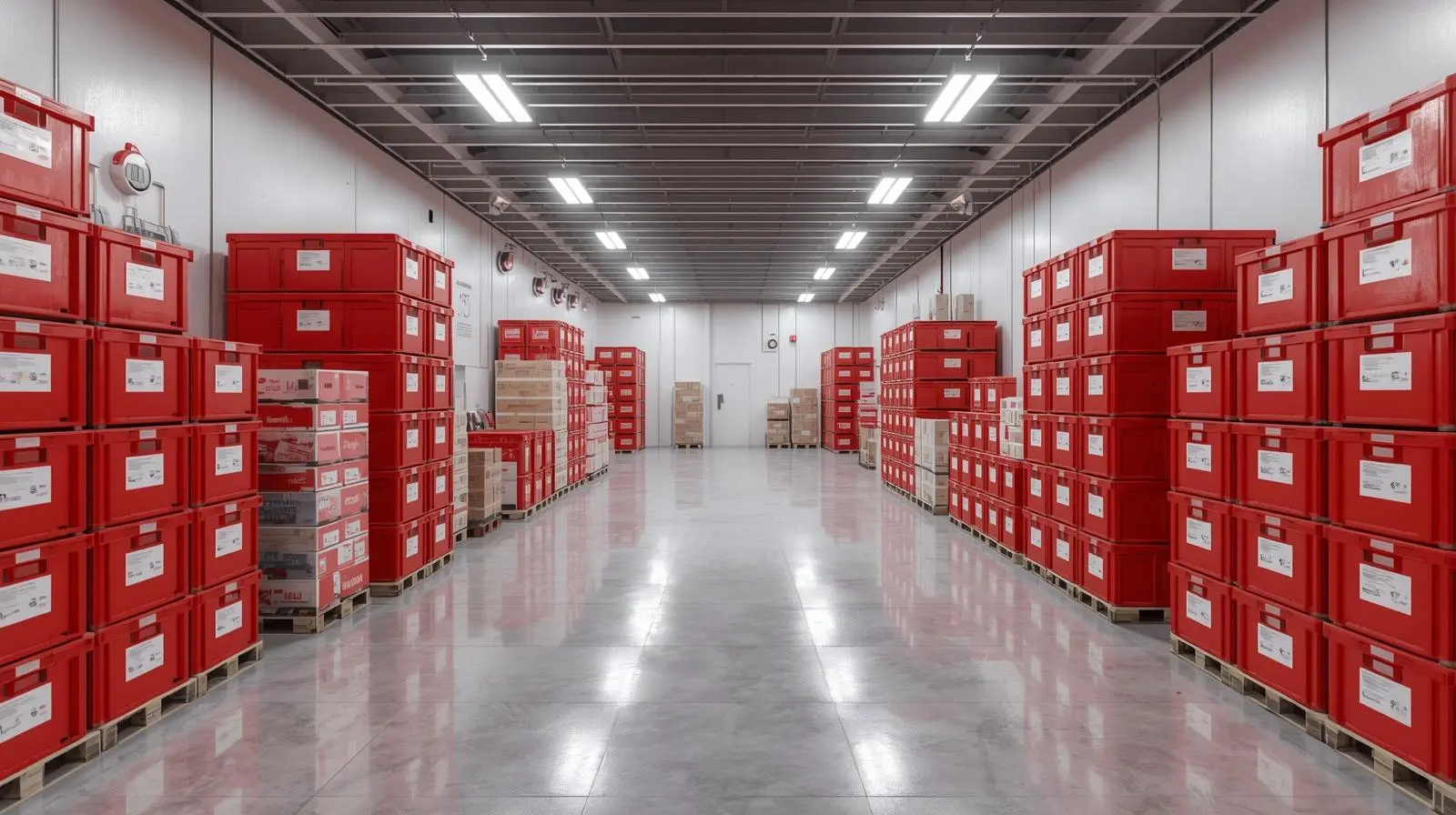
Policies often exclude certain categories of belongings, which surprises many tenants.
Typical exclusions:
- Cash, jewelry, and precious metals.
- Hazardous or illegal items.
- Items damaged by tenant negligence (e.g., leaving units unlocked).
- Improperly packed items damaged by pests or mold.
Comparing Insurance and Legal Protection
| Type of Protection | What It Covers | What It Excludes |
|---|---|---|
| Tenant Insurance | Theft, fire, water, and natural hazards | Cash, jewelry, illegal goods, and negligence |
| Operator Liability | Facility safety and code compliance | Stored belongings themselves |
| Legal Compliance | Fire codes, CCTV, alarms | Guarantees for individual goods |
Closing Insights: Security, Climate Protection, and Insurance in Dubai Self Storage
Choosing a self-storage facility in Dubai is about more than finding extra space; it’s about protecting your belongings from theft, fire, humidity, and water damage. The safest storage providers combine 24/7 CCTV surveillance, biometric access, unit-level alarms, and climate-controlled environments while complying with the UAE Fire and Life Safety Code.
Since most operators limit liability, tenant insurance is essential to cover risks such as theft or environmental damage. By inspecting facilities in person, testing access systems, and checking climate logs, tenants can distinguish between budget storage and truly secure providers.
In the end, self-storage in Dubai is not just about convenience; it’s an investment in security and peace of mind.
Frequently Asked Questions (FAQs)
What is the most important security feature in a Dubai storage facility?
Full CCTV coverage with 30+ day video retention is essential.
Do storage facilities in Dubai require tenant insurance?
Most reputable operators either require or strongly recommend it.
How does climate affect storage security in the UAE?
Heat above 45°C and humidity around 60% can damage electronics, furniture, and fabrics.
Are smart locks safer than padlocks?
Yes. Smart locks cut unauthorized access incidents by about 40%.
What fire safety standards apply in Dubai storage facilities?
All must comply with the UAE Fire and Life Safety Code of Practice.
Can water damage occur in Dubai storage?
Yes. Leaks and flash floods make drainage and raised flooring important.
How often should tenants check their units?
Every 30–45 days for personal storage, every 7–14 days for businesses.
Do businesses need higher security than individuals?
Yes. Businesses require audit trails, unit-level alarms, and commercial insurance.
What is the best way to prevent mold in Dubai storage?
Use climate-controlled units, sealed plastic containers, and moisture-resistant covers.
Rakan Al-Juraid is a logistics specialist with a focus on commercial storage systems and high-security asset management. With extensive experience in industrial warehousing, he specializes in inventory tracking technology and transit safety. Rakan’s expertise lies in streamlining the storage process for both businesses and homeowners through strategic planning. His writing offers data-driven advice on insurance for stored goods, fire-safe environments, and heavy-duty logistics. He is committed to ensuring that every square foot of storage is utilized with maximum security and efficiency. Rakan aims to provide professional-grade storage standards to every reader navigating the moving process.
Layali Al-Samer is a seasoned storage and organization expert with over 12 years of experience in the logistics industry. She holds a degree in Spatial Design, specializing in high-density residential storage and climate-control solutions. Layali focuses on inventory management for luxury goods and long-term preservation techniques for sensitive heirlooms. Her articles provide expert guidance on maximizing unit efficiency and protecting valuables from environmental damage. She is dedicated to helping readers declutter their lives through strategic and organized spatial planning. Layali’s goal is to ensure every possession is stored with the highest level of care and precision.
- This author does not have any more posts
